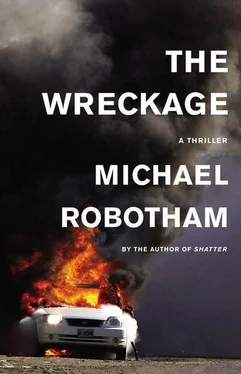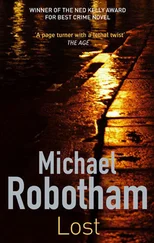Michael Robotham - The Wreckage
Здесь есть возможность читать онлайн «Michael Robotham - The Wreckage» весь текст электронной книги совершенно бесплатно (целиком полную версию без сокращений). В некоторых случаях можно слушать аудио, скачать через торрент в формате fb2 и присутствует краткое содержание. Жанр: Триллер, на английском языке. Описание произведения, (предисловие) а так же отзывы посетителей доступны на портале библиотеки ЛибКат.
- Название:The Wreckage
- Автор:
- Жанр:
- Год:неизвестен
- ISBN:нет данных
- Рейтинг книги:3 / 5. Голосов: 1
-
Избранное:Добавить в избранное
- Отзывы:
-
Ваша оценка:
- 60
- 1
- 2
- 3
- 4
- 5
The Wreckage: краткое содержание, описание и аннотация
Предлагаем к чтению аннотацию, описание, краткое содержание или предисловие (зависит от того, что написал сам автор книги «The Wreckage»). Если вы не нашли необходимую информацию о книге — напишите в комментариях, мы постараемся отыскать её.
The Wreckage — читать онлайн бесплатно полную книгу (весь текст) целиком
Ниже представлен текст книги, разбитый по страницам. Система сохранения места последней прочитанной страницы, позволяет с удобством читать онлайн бесплатно книгу «The Wreckage», без необходимости каждый раз заново искать на чём Вы остановились. Поставьте закладку, и сможете в любой момент перейти на страницу, на которой закончили чтение.
Интервал:
Закладка:
Even in the muddy half-light, Luca can see the dark liquid stains running down the brick walls and smell the ageing feces and sweat. The damp eight-foot-by-ten-foot cell has no window or furniture, just a soiled pillow and blanket on the floor.
There are six cells side by side in the basement of the al-Amariyah police station. Luca knows this building. He came here once to investigate the deaths of six prisoners who were handcuffed and blindfolded before being lined up against a wall in a courtyard and shot. Witnesses claimed the man who pulled the trigger was a senior Iraqi politician in the interim government. One described it as an unintended act of mercy because the men had been beaten for so long they simply wanted to die.
The corpses were removed by the Prime Minister’s bodyguards and driven off in a Nissan utility. Another witness said they were buried west of Baghdad, in open desert country near Abu Ghraib. Luca imagines these men, naked and still, garlanded with bruises, lying in unmarked graves.
He dreams. He wakes. Reality is such a hazy, shallow state and his nightmares, the recurring ones, are full of the speaking dead and bones bursting out of the ground. How many days have passed since his arrest? They took away his watch, along with his belt and shoelaces. They took away his gun. They had laughed at the size of it. A woman’s gun, they said. One bullet.
For the first few hours he had bellowed through the meal hatch, demanding to contact the American Embassy. When his voice grew hoarse he saved his strength, concentrating on small details like the chain hanging from the ceiling and the discarded length of hosepipe in the corner. He didn’t want to imagine what they were for.
They came for him eventually. He was handcuffed and dragged along an unventilated corridor. A guard slapped the heel of his hand three times against the steel door, which creaked partway open, revealing the apprehensive face of a young soldier. Shoved forward, hard against a wall, Luca felt a stabbing sensation in his forearm. A man in white. A needle in his hand. The room began to dip and sway, rolling like the deck of a ship in a storm. Someone was speaking to him, but he couldn’t focus on the face. What big eyes… such a big mouth… so many questions.
At some point he had fallen asleep or lost consciousness and woken back in the cell. He can hear people outside now… a key rattling in the lock… the hinges groan. The same guards pull him upright, pushing him along the passageway. He needs to pee. The desire borders on torment.
Another room. A table. Two chairs. A single light bulb. A window. A familiar figure. General al-Uzri takes off his jacket. His forearms bulge below the short sleeves of a cotton shirt. His jacket is folded and placed neatly on a spare chair.
“I am sorry to have kept you waiting,” he says. “I trust you have been treated well.”
“No.”
“Perhaps our prisons aren’t quite up to American standards.”
He uses the word “American” like it belongs to a lesser life form.
“Why am I here?”
“You have been accused of killing two unarmed civilians in a village near Mosul.”
“We were fired upon by insurgents.”
“Not according to our witnesses.”
“What witnesses?”
“The men you murdered had wives and families.”
“They were insurgents.”
“You targeted the pickup. You shot out the nearside tires causing the vehicle to roll. Then you stopped and poured petrol over the occupants and set them alight.”
“That’s bullshit! We were fired upon. I can show you the bullet holes.”
“Your driver has given us a statement.”
Luca struggles to breathe. He’s talking about Jamal.
“I don’t have a driver.”
The general laughs. “Such loyalty is commendable, but you have left it rather late to be so protective of your accomplices.”
Luca half rises from his seat, but strong hands shove him down.
Al-Uzri takes a matchstick from a box on the table and chews the end to a fibrous tail, painting spit across his teeth.
“What were you doing in the village?”
“Researching a story.”
“What story?”
“The murder of four bank guards.”
“A falling out among thieves.”
“No, it was more than that.”
Al-Uzri touches his chin with his index finger.
“Vigilante justice. Innocent people dying. Nobody ever held to account. Do you think that Iraqi law doesn’t apply to you because you carry a foreign passport?”
“No.”
“Do you think you’re better than we are?”
Luca shakes his head. The general has taken a knife from the scabbard on his belt. It has one serrated edge and the other one smooth, sharp, tapering to a point. He splays one hand on the table and places the tip of the blade between his thumb and forefinger, holding the knife vertically.
“This country is old. My ancestors created writing and philosophy and religion when yours were painting drawings on rock walls. This was the cradle of civilization, but still you treat us like savages and barbarians.”
In a blur of speed, the knife rises and falls, spearing the table between each of his fingers, back and forth, tracing his hand. He stops and raises his fingers. Not a scratch.
He signals a young officer to come closer. “Would you die for me?”
“Yes, General.”
“Put your hand on the table. Spread your fingers. Would you lose a finger for me?”
He hesitates. Al-Uzri laughs.
“What is the more realistic fear-dying or losing a finger, eh? Perhaps you would like to try it, Mr. Terracini?”
“I’m not a fan of party tricks.”
“No? I saw the result of your party near Mosul. Your visa has been canceled. You have two days to leave Iraq.”
“On what grounds?”
“Undesirable activities.”
“Bogus grounds.”
The general chuckles wetly. “Complain to your embassy. See if anyone listens. You are not the most popular journalist in Iraq, Mr. Terracini. Messengers are not valued when they bring nothing but bad news.”
Al-Uzri has a thin trickle of blood dripping from the end of his index finger. A nick. He slides the knife into a scabbard and adjusts his beret. Luca is dragged to his feet and pushed against the wall. Handcuffed and hooded, he is taken up the stairs, into the daylight. A gust of wind brings the familiar stink of the city beneath the fabric.
The car journey has none of the menace and uncertainty as when he was arrested. The police officers are talking about football and their favorite pastry shops. Anger replaces the fear. He’s alive. Resentful. Worried about Jamal.
The hood is lifted. Brightness stabs at his eyes. They’re moving through a checkpoint into the International Zone. A policeman leans across the seat and gives him a plastic bag containing his mobile phone, his wallet, but not his pistol.
He is handed over to a military attache at the US Embassy. Two uniformed guards escort him along marbled corridors, past triumphant arches and iron busts of Saddam Hussein. He is taken to a waiting room with a view across the sluggish brown river. Downstream, two bridges, bombed and rebuilt, are bowing under the weight of traffic. Beyond them, flat-bottomed skiffs ferry passengers between the banks.
On a table there are copies of the Wall Street Journal and Newsweek, fanned in a perfect circle. A TV monitor is playing Bloomberg, with market quotes streaming under a woman who is speaking from half a world away.
Moments later an inner door opens and a man in his mid-forties ushers Luca inside, pointing to a chair. His eyes seem to radiate earnestness and goodwill.
His name is Jennings. He doesn’t give a first one. The State Department seems to have dispensed with given names. He looks like a former college football star or a future politician, with one of those preppy hair partings that have been fashionable since John Kennedy was in the White House. Dressed in casual trousers, a shirt and tie, he has ink smudges on his fingers. He opens a briefcase and takes out a file, a stapler and a selection of pens. Props.
Читать дальшеИнтервал:
Закладка:
Похожие книги на «The Wreckage»
Представляем Вашему вниманию похожие книги на «The Wreckage» списком для выбора. Мы отобрали схожую по названию и смыслу литературу в надежде предоставить читателям больше вариантов отыскать новые, интересные, ещё непрочитанные произведения.
Обсуждение, отзывы о книге «The Wreckage» и просто собственные мнения читателей. Оставьте ваши комментарии, напишите, что Вы думаете о произведении, его смысле или главных героях. Укажите что конкретно понравилось, а что нет, и почему Вы так считаете.












